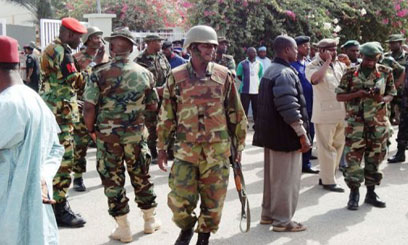President Goodluck Jonathan, facing his worst crisis of his nine-month tenure as he grapples with a surge in attacks by the Islamist sect Boko Haram and mounting social discontent, vowed to beef up security.
Kano, Nigeria’s second largest city, was left reeling after bombs were set off and gun battles raged in a wave of coordinated attacks after Friday prayers that targeted mainly police buildings.
“We have discovered eight bomb-laden cars in different areas of the city,” a senior police officer told AFP on condition of anonymity on Monday. “We are still facing serious security threats.”
Another car was found filled with explosives outside a government-run fuel station in Kano on Sunday, as Jonathan paid a visit of solidarity to the city.
Jonathan said some suspects had been arrested and vowed that his government would track down the backers of Boko Haram, which has staged a series of increasingly bloody attacks, often targeting Christians.
“We will strengthen the security in Kano and other parts of the country,” Jonathan added.
The violence has raised fears of an all-out civil war in Africa’s most populous nation and top oil producer.
About 200 Muslim clerics and political leaders gathered for peace prayers in Kano, an ancient holy Muslim city of about 4.5 million people.
“I will pray to God that we should never re-live the catastrophe that resulted in the deaths and maiming in our city,” Kano State governor Rabiu Musa Kwankwaso said.
Kano’s emir Ado Bayero told the clerics: “I enjoin you to continue praying for peace and stability in our city. I call upon you to use any religious fora to pray for peace in our land.”
A purported spokesman for Boko Haram claimed responsibility for the attacks, saying they were in response to a refusal by the authorities to release its members from custody.
Some detainees being held at a police station in Kano were thought to have been freed during Friday’s attacks.
Boko Haram is a shadowy group believed to have a number of factions with differing aims, including some with political links and a hard-core Islamist cell.
Jonathan has said some Boko Haram members have infiltrated government – from the security agencies to the legislature and the executive arm of government.
Senate president David Mark said he and the speaker of the House of Representatives Aminu Tambuwal, had ignored security risks to travel to Kano.
“We want to ensure that a few misguided Nigerians who have been led into this action don’t take this country hostage… it is not about religion, this affects the entire nation,” he said.
Former president Olusegun Obasanjo sought to downplay the crisis.
“Even though it is a big challenge to the Nigerian people and its government, it is not one that… shakes Nigeria to its foundation,” Obasanjo said in Banjul on Sunday.
Jonathan imposed emergency rule in parts of Nigeria’s north on December 31 after a wave of violence blamed on Boko Haram, including attacks on churches on Christmas Day.
But Kano, which had escaped the worst of the violence in recent months, was not among the areas covered.
Relief workers said the death toll from Friday’s attacks was at least 166 but a doctor at a major hospital said the toll could soar to 250.
Around 50 people were gathered Monday outside the main hospital’s morgue waiting to collect remains of their loved ones for burial.
Lying on a bed in a ward at the hospital with a bullet wound in his leg, tannery worker Monday Joseph, 29, said he was driving home from work with four colleagues when one of the bombs went off.
They abandoned the car and started running.
“The four of them died. I am the only one who survived,” he told AFP.
Nigeria’s supreme Muslim leader, the Sultan of Sokoto Sa’ad Abubakar, said the attacks were “perhaps the worst in terms of the loss of lives”.
“It is evidently clear that Nigeria is passing through a trying moment of general insecurity of overwhelming magnitude,” he said.
Most of the recent major attacks have occurred in the northeast of the country, with many taking place despite the state of emergency.
Boko Haram claimed a Christmas Day bombing at a church near the capital Abuja which killed at least 44 people and an August attack against UN headquarters in Abuja that killed 25.
Attacks targeting Christians have given rise to fears of a wider religious conflict in Nigeria, which is roughly divided between a mainly Muslim north and predominantly Christian south.
But attacks blamed on Boko Haram have included a wide range of targets, including Muslims.










































